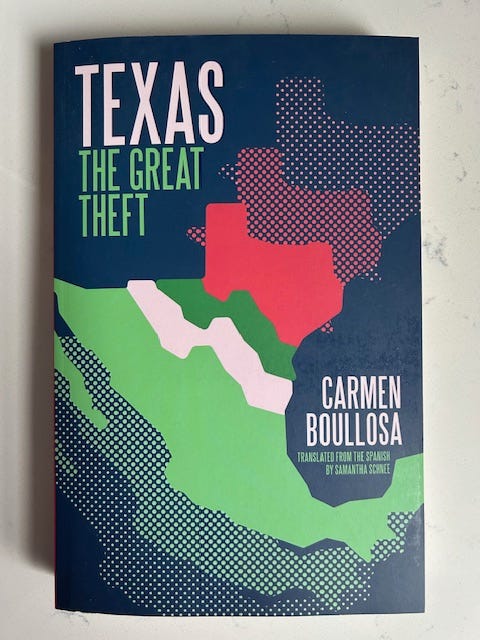'Texas: The Great Theft' by Carmen Boullosa
'You'd have to be shameless to do that. Their hands are full but they keep taking more.'—Review #254

‘Texas: The Great Theft’ is the novel Books on GIF subscribers voted for me to review from among three books that had an introduction written by critic and scholar Merve Emre. Thank you, once again, for picking the book I most wanted to read. Though I’ve traveled there several times, I was eager for Boullosa to take me on an historical and literary journey to:

Here’s the book’s cover:

A local sheriff insults Don Nepomuceno and all hell breaks loose. Nepomuceno is the prominent son of Doña Estefania, a woman who owns much of the land along the recently created Texas-Mexico border; he’s also a cattleman and an artist with a lasso. The sheriff, on the other hand, is a reprobate. As the novel opens, Nepomuceno is crossing the main square in Bruneville, a fictional Texas border town across the river from Mexico’s Matasánchez, when he sees the sheriff beating a drunk old cowboy who’s known for playing the violin and composing songs. Nepomuceno intervenes to help the cowboy, and the sheriff, named Shears, cuts him with a racial slur. Bystanders overhear this, and the epithet goes viral—well, the 1859 version of going viral. It’s gossiped from person to person on both sides of the river, like:

As the word gets passed in a series of scenes, vignettes and asides, we meet the area’s inhabitants. There are native peoples (both those indigenous to the area and others forcibly relocated there), Mexicans, former and current slaves, immigrants from Europe and China, Texas Rangers, gunslingers, priests, lunatics, ne’er-do-wells, maids, shopkeepers, cattle thieves, kidnapped women, riverboat operators, cross-dressing card sharps, shady white businessmen, a children’s gang and many others. There are so many characters! A long list is included at the back of the book, and reading it felt like:

The story advances through bits of information we pick up in the gossipy vignettes. Nepomuceno shoots the sheriff (in the leg, he’s fine), rescues the cowboy and flees with his men over the river into Mexico. The Texas Rangers unsuccessfully pursue him to the water’s edge, and take out their frustration at not capturing him by attacking and brutally murdering innocent Mexicans. This is how they send a message about maintaining law and order: by hanging corpses from a tree. Nepomuceno eventually gathers his forces and crosses back over the river to reclaim the borderlands as part of:

It’s not much of a spoiler to say their efforts don’t go as planned. The novel is loosely based on actual events in 1859 known as the First Cortina War, and the cities of Brownsville and Matamoros—the inspirations for Bruneville and Matasánchez—still are part of the U.S. and Mexico, respectively. Boullosa uses the historical moment to examine the interconnection of the bordering nations and how that relationship has often been fraught with injustice, corruption, ignorance, bigotry and violence. She shows us how borders are often arbitrary and how for some people, particularly on the northern side, cruelty is its own aim. But she uses humor to convey these points, and the drama is recounted by an unnamed narrator who reminds me of a chatty person you sometimes meet at a bar who’s like:

‘Texas: The Great Theft’ offers a fascinating take on U.S.-Mexico relations that is chilling one moment and absurd the next. It also is a marvel of narrative structure, despite its fragmented and meandering path, and it coheres as a tale that is vital and relevant to today’s issues. But I must admit that I like the idea and execution of the book more than I enjoyed reading it. I find it easier to connect to plot- and character-driven novels, and I often found myself getting distracted from ‘Texas’ by my phone or by people on the train. I rarely got totally immersed. But don’t let my personal preferences persuade you against this book. It’s good, and I recommend it.
An opening excerpt:
Let’s state it up front, so we don’t get muddled: this is the year 1859.
We’re on the northern and southern banks of the Rio Bravo, known to some as the Rio Grande, in the cities of Bruneville and Matasánchez. Heading into the wind on horseback we could make it to the sea in half a morning.
Bruneville and Matasánchez call themselves cities, but you be the judge of whether they should be called towns.
I should tell you a few things about them: Bruneville is part of the state of Texas; Matasánchez is part of Mexico. The former (Bruneville) hasn’t been around long, only since ’21, when Mexico declared its independence.
That year, Mexico’s Far North was sparsely populated, though there were a few ranches scattered around—like the ones owned by Doña Estefania, which extend from the Nueces River all the way south to the Rio Bravo—you’d have to ride four days to cross her lands from south to north.
Back then buffalo flourished. Mustangs ran free. Since the grasslands hadn’t been sown, you didn’t find cattle in herds; they grazed in twos or threes. But the Indians abounded, and they traveled in bands.
My rating:

‘Texas: The Great Theft’ (Texas) by Carmen Boullosa was originally published by Alfaguara in 2013. Translated from the Spanish by Samantha Schnee and published by Deep Vellum in 2014. Tenth anniversary edition featuring introduction by Merve Emre was published by Deep Vellum in 2024. 331 pages. $16.69 at Bookshop.org.
What’s next:
Books on GIF does not solicit or accept review copies. We feature books we purchase at independent bookstores around New York City and on our travels, or were borrowed electronically from the Brooklyn Public Library.
Before you go:
ICYMI: Review #253
Read this: Check out the books I’m excited to read this spring in my friend Alicia’s wonderful newsletter
. She and I are currently reading ‘Jane Eyre,’ and I’m excited to read her review of it. Be sure to check it out!Read this, too: What do you think of audiobooks? My friend
discusses why she hates them in her terrific newsletter Point of Departure. I have no strong feelings about them—the only audiobook I’ve listened to recently was ‘Nightwood’ by Djuna Barnes.If you enjoyed this review:
Thanks for reading, and thanks especially to Donna for editing this newsletter!
Until next time,

MPV








As always, impeccable use of gifs chef 👨🍳
have never heard of this book! based on your review i’m interested to check it out. Thank you, as always, for the shoutout! you’re too kind 💗📚